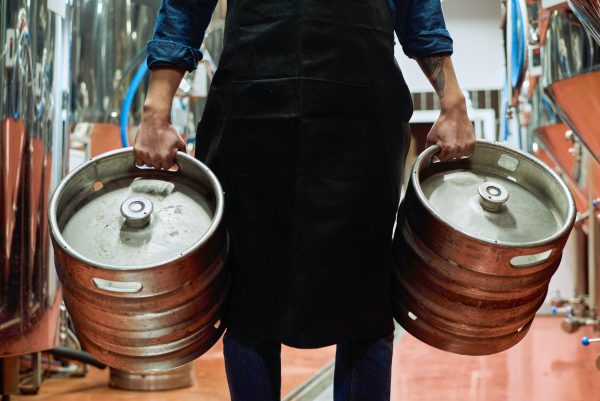If you have no experience as a bartender and want to work your way into a bartending position, getting a job as a barback is one of the most common ways to make your way behind the bar. It’s an incredibly important position and is also sometimes called “bar backer,” “bar back,” “bar runner,” or just “runner.”

Photo by Maxwell Jayes via www.unsplash.com
This is a long post, so here are some links to skip ahead!

Photo by Getty Images via www.unsplash.com
What is a Barback?
I always imagine the barback as the person that is bailing water out of a sinking cruise ship. While the guests are having a great time and the staff is working hard serving them, the barback is bailing out water like crazy, trying to keep the ship afloat. A good barback will keep the ship afloat, and no one will ever know there was a problem. A bad barback, on the other hand, will make the ship sink – fast!
The main role of the barback is to support the bartenders. Each bar or restaurant will have different responsibilities, but the core tasks are usually the same.The barback’s job is all about working ahead, managing your time well, and anticipating the needs of the bartenders you work with.
What Does a Barback Do?
There’s a reason I called the barback the “bartender’s sidekick.” But maybe it’d be better described as “the bartender’s lifeline.” The barback is responsible for doing all of the invisible little tasks that ensure the bartenders are able to do their job quickly and efficiently and that the bar keep running smoothly.

Photo by Nathan Anderson via www.unsplash.com
Before Service:
Before service even begins, their main responsibility is to get the bar ready for service. This can mean that the barback is putting away the liquor and beer delivery that came in during the day; stocking each bar station with straws, napkins, and coasters; prepping juices for service; cutting garnishes; and prepping and back ups. They basically work with the bartenders to ensure that the bar is fully stocked and ready to open for business.
During Service:
During the shift, the barback position is typically one of the busiest in the bar/restaurant. If you ever see a young person that is constantly moving behind the bar and rarely interacting with guests, most likely that is the barback. During a shift, they will typically be responsible for cleaning and refilling glassware, changing kegs, cleaning the bar top, and restocking everything in the bar from spirits to syrups. Rarely will you see them taking drink orders or mixing drinks.
After Service:
When the bar or restaurant closes for the night, the barback will work with the bartenders to break down the bar. This could mean taking out the trash, restocking bottles, and cleaning all the glassware.

Photo by Getty Images via www.unsplash.com
Common Barback Duties, Tasks, & Responsibilities:
- Replenishing bars with everything they need before, during, and after service. (This includes but isn’t limited to restocking liquor and wine; changing out beer kegs; washing & restocking garnish, syrups, napkins, straws, etc.)
- Cleaning and organizing the liquor room, beer storage area, wine storage, and dry goods area
- Cleaning everything else (Yes, everything. Counters, dishes, glassware, tools, floors, etc.)
- Working with managers to keep supplies up-to-date and make sure there are enough for service the next day
- Taking out the garbage
- Putting away incoming beer, wine, and liquor orders
- Tending to emergencies like picking up broken glass, fixing clogged drains, cleaning spills and unexpected messes, etc.
- Relaying information to / from the kitchen, security, the bar, etc.

Photo by Getty Images via www.unsplash.com
How much are Barbacks paid?
In the USA, barbacks are usually paid minimum wage but will often get a portion of the bartenders tips. Typically, you’ll either receive a percentage of the bartenders’ total tips or a percentage of total sales. Depending on the bar and market, barbacks can make pretty decent money! I know many bar backs that make more money at nightclubs/high volume speakeasies than bartenders working at restaurants/neighborhood bars. It’s all about where you land, but making somewhere between 80-200 a night in tips as a bar back is not unheard of.
While most salary and wage reports for the barback suggest you can expect to earn around $17-$20k per year, they vary dramatically by market– and it’s also possible that these numbers exclude tipped earnings. For a good baseline, consider the local minimum wage, and then multiply by your expected hours. For example:
- A barback working full time hours in San Francisco would earn around $30,000-$32,000 in minimum wage earnings alone (at $15.50 minimum wage in California, current as of November 2023). However, the hourly rate in that area according to ZipRecruiter typically ranges from $14-23 at the time of publish.
- While minimum wage in New York is currently $15/hr, the going rate for a barback position on ZipRecruiter is $10-15/hr, with the average around $13/hr. So a barback working full time hours in New York City would make closer to $25-27k a year according to the job postings I’m seeing.

Photo by Getty Images via www.unsplash.com
Note: It’s also very likely you won’t be working a full 40 hours a week, so the above numbers are probably a bit on the high side.
As for tips, since tip-out policies differ widely by market and even by restaurant, it’s hard to estimate. I have heard that you can estimate around 1-2% of total sales (or 5-15% of tips).
Outside the USA, most bar backs (often called “bar runners”) are paid an hourly wage without additional tips. Again, this will vary greatly depending on your market but shouldn’t dip below your the legal minimum wage in your area.

THE LIFE OF A BAR RUNNER:
If you are looking into becoming a bar runner, (which I highly recommend for starting out in a bar), here are a few things to take into consideration:
- It’s (Very) Physical: First and foremost, this is a physically demanding job. You’ll probably be lifting kegs, carrying multiple crates of booze around all night, lugging around buckets of ice to multiple bars, and basically running from the minute you are on the clock until the minute you leave. If you ever wanted to get a high score with your Fitbit, this is the job for you.
- It Can be a Thankless Job: This role also takes some thick skin, as most of your co-workers will be asking you for items throughout your shift– and some of them won’t be nice about if when they ask (especially in the beginning). There’s very little glory in barbacking; and unfortunately, it’s too rare to get words of appreciation from bartenders, managers, or guests.
- The Schedule to Expect: Since this role is only needed when the bar is busy, you may only be working Thursday, Friday, and Saturday. This could be good if you are going to school or working a second/third/fourth job during the day.

Photo by Daniel Lee via www.unsplash.com
TRAITS OF A GREAT BARBACK:
Got yourself a barbacking job and want to knock it out of the park? Here are some traits of a great barback. Follow this example to get noticed – and possibly even get an the opportunity to work your way up to a server or bartender position.
- They Hustle – In this role, speed is important. Moving with a sense of purpose and being quick behind the bar is key for a good barback. If the bartender needs something on the fly (aka right now), the barback makes it happen quickly and then gets back to their normal duties.
- Masters of Observation – This shows itself in many forms. First, it can be them noticing that supplies or products are running low or that the bartender in station 1 usually likes the garnish tray on the left instead of the right. It can also be them noticing how a particular bartender can pour more drinks than any other bartender on the team and learn how they do it, or how another bartender makes higher tips than other bartenders. Great barbacks realize this is a good training ground for when they become bartenders themselves, and they’ll take the opportunity to soak up as much information as possible.
- Multitasking Geniuses – The best barbacks I’ve worked with always have a running list of items they need to accomplish. For example, if a bartender needs a bottle of Grey Goose on the fly, they’ll head over to the liquor room, grab the bottle of Grey Goose as well as a stack of plates, a pack of straws, or a 6-pack of Corona to restock the fridge. They maximize every minute, especially when it’s busy.
- Anticipate the Bartender’s Needs – As a bartender, your mise en place is your lifeline, and there have been many times that I have noticed I’m running out of ginger beer only to have my barback replenish it before I need it. Restocking a bartender’s garnish tray, syrup bottles, and mixers before they run out goes a long way.
- Have a Plan When Things Get Busy – This goes hand-in-hand with multitasking. By planning ahead, you can better use every minute. For example: “I’m going to overstock bar A with XYZ so I can concentrate on helping bars B and C with glassware, and then I’ll come back to bar A in 45 minutes.”
- They Know “the Dance” – This is something that you can only learn with time behind a busy bar. After a while, you begin to develop a sense of when and how to move as a team, sliding past each other without impeding each other’s movement. Watching a busy bar team that knows how to move together can be like watching a choreographed dance recital, but if one person does not know how to move with the team… that someone’s going to be wearing a beer the rest of the night. If you’re brand new, know that this takes time – but paying attention to how everyone in your bar moves and communicates will help you pick it up quickly.

Copyright A Bar Above
TRAITS OF A BAD BARBACK
On the other hand, not every bar back is great. Here are some bad habits to avoid:
- They Never Quite “Get It” – This basically applies to all of the traits listed above. If time goes by and you haven’t developed the traits listed above, you may find the role frustrating and struggle to move up and out of the barback position. Learning is key: If you’re not taking the time to learn as you go, you may want to look at a different position or line of work. (Especially if you want to become a bartender!)
- Houdini Syndrome – Breaks are highly encouraged when things are slow, but if the bartenders are 3 deep and you take that moment to grab a smoke or a Chalupa from Taco Bell, you’re probably not going to last long as a barback.
- Inability to Multitask – If you are only getting one thing done at a time, you are going to have a difficult shift and probably not going to make a lot of money at the end of it. While you are standing in front of the dishwasher, waiting for the cycle to complete, you could be clearing the bar top, writing a stock list, replenishing garnish stations, or doing anything other than watching the shiny side of the dishwasher. Be aware of everything going on, and make sure your hands are never empty.
- Try to Run Before They Crawl – Some new barbacks are so completely focused on becoming a bartender that they miss many of the basic steps of their position. Instead of wanting to make drinks, pour wine and beer for the pick-up window, or chat with guests, instead concentrate on making sure that everything you need to get done is already done. Then maybe you can practice free pouring – if time allows. Dropping the ball on your own job is definitely not going to impress your manager into giving you a bartending shift.
- Wants to Talk to Everyone – Restaurants and bars are very social places, and building relationships with regulars and staff is essential; but if you spend most of your time at the host stand or try to spark up conversation with everyone at the bar, you’re probably going to cause a lot of frustration for the bartenders that you work with. Remember, your job is to support the bartenders; and if they aren’t getting the support they need because you’re chatting up a guest, they will not be happy about it!

Photo by Qui Nguyen via www.unsplash.com
Choosing Where to Barback:
Still want to give it a try? Great! Before you apply to any bar, it’s important to get a sense of the place:
- Are the bartenders friendly? (You’ll be working with them!)
- Is it busy? Which days are the busiest? (That’s when you’ll probably be working.)
- Is the bar more than one story tall? (You’ll be carrying cases of booze up/down those stairs.)
- Is the manager friendly? Do they promote barbacks to bartenders?
A few visits and a couple conversations with the people there can tell you a lot about a bar and can save you a lot of physical and mental stress down the road.
Barback to Bartender: Getting Promoted
Chances are pretty good that you took the barback job because you’re looking for your foot in the door of the bar industry and are hoping to work your way up to bartender. Good call! This is one of the most common (and effective) ways to break into a bartender role in a competitive market. So now that you have a barback job, how do you work your way up?

Photo by Getty Images via www.unsplash.com
Step 1: Be a Great Barback!
The quickest way to kill your chances at getting a bartending shift is to be a bad barback. Bartending is seen as the next step – Why would they promote someone who can’t succeed at a simpler job? Scroll up or click here for some tips on what makes a great barback – and what to avoid.
Step 2: Position for a Shift
The next step is to actually start positioning yourself for a shift. The best way to do this is to look for “baby steps” – opportunities to learn individual pieces of the bartender’s job, even before you get a full shift. This proves to the team that you’re capable without the risk.
Learning on the Job
- If the bartenders are invited to a training event, ask to join – even if it’s on your own time.
- Before or after your shift, practice your speed-pouring with water in an emptied liquor bottle
- Even though you aren’t making drinks, make sure you know the recipes for the house cocktails and common drinks. If you’re ready to learn more on your own time as you work your way up, sign up for our Mixology Certification course so you can impress your manager when you’re ready to move up!
- Watch the more experienced bartenders work, and pay attention to how they make drinks. If there is one bartender who is particularly quick, watch them to find out what they are doing differently. The same applies if there is one bartender who makes a higher tip percentage than the rest, watch them to find out how they are doing it.
- When it’s not too busy, ask the bartender if you can help fill beer, wine, ice tea, and soda orders. This will give you experience with pouring the right amounts and help you learn the rhythm of the bar.

Photo by Aurelien Lemasson Theobald via www.unsplash.com
Communicate!
If you want a bartending shift but nobody knows, you’re not going to get very far. Make sure your manager is aware of your long-term goals, and check in regularly. It doesn’t hurt to ask, “What skills do you think I need before I can be eligible for a bartending shift?”
Finally, offer to take on the shift that nobody wants. Usually, this will be a very slow shift, like Monday lunch or Sunday afternoon. Not only will nobody fight you for it, but the manager should feel more comfortable giving it to a “new” bartender since it is likely to be slow.

Photo by Andreas Forsberg via www.unsplash.com
Step 3: Your First Shift
So you got a Monday lunch shift – or someone called in sick. Either way, you’re in! Ideally, you’ll be working alongside a more seasoned bartender who can show you the ropes; but even if you’re not, here are a couple things to keep in mind:
- Listen Carefully and Learn Quickly — There’s a lot to learn: Pay attention to the other bartender, and try not to ask twice. You thought being a barback was hard… Now you have to do the dishes and make the drinks!
- Keep Busy. Behind the bar, you are never done. There are dishes to clean, garnishes to prep, and bottles to dust. If you don’t see anything obvious, ask the other bartender if there’s anything you can do. This will show that you’re a hard worker and will give you another opportunity to learn while someone is there to guide you.
- If it Gets Busy, Get Out of the Way. This is a bit of a judgment call between doing your best to help and knowing when to just stand back. If it gets busy, the bartenders on shift will fall into their well-choreographed pattern, and you may do more harm than good if trying to help.
The Barback: The Invisible Super Hero of the Bar
Make no mistake – barbacking is a tough job. But it’s absolutely vital to our industry and to any high-volume bar. And it’s also a fantastic stepping stone to work your way up to a bartending job. If you work hard, pay attention, and try to get better every day, then you’ll make a fantastic barback!





Thanks Chris! How long do you recommend for a motivated person to work as a barback before they get the hang of it and move on to bartending?